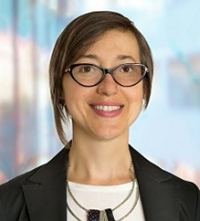Dr. Alisa Grigorovich – Change Agent
Transforming health care delivery and improving health systems with tech

While completing her first undergraduate degree, Dr. Alisa Grigorovich worked as a research assistant in a clinical neurology unit. It was here that she became interested in the health care experiences of older persons living with complex disabilities, and their caregivers.
This opportunity allowed her to witness the everyday struggles these individuals face in terms of securing much needed care, prompting her to shift her focus in graduate school to aging and health services, as well as policy research.
More recently, her experience working in AGE-WELL, Canada’s research network on technology and aging, also sparked a new interest: the potential of artificial intelligence and other technologies to improve assessment, detection, and/or prediction of violence in hospitals and long-term care homes. For instance, combining the use of video cameras with artificial intelligence to automatically detect signs of aggression in individuals’ facial expressions or movements. It is not uncommon for a patient, especially individuals with a dementia, to engage in aggressive and sometimes violent actions toward another resident or a person taking care of them.
Dr. Grigorovich’s research is interdisciplinary and a key focus of this work is exploring the impact that these technologies may have on marginalized older adults, particularly those living with dementia, as well as their families and care providers.
The potential impact of Dr. Grigorovich’s work is far-reaching.

Dr. Alisa Grigorovich
Health Systems Impact Fellow
The push for artificial intelligence and implementation of monitoring technologies to prevent violence is relatively recent, and there are key gaps in knowledge about the experiences and needs of key stakeholders (i.e. older adults, family members, care providers).
Implementation of monitoring technologies in health care has the potential to fundamentally transform health care delivery and experiences of care. However, to ensure that this transformation is ethical and fair will require a critical, interdisciplinary evidence base and the engagement of those who receive and provide care.
The overall contribution of her work is to integrate the various perspectives of these stakeholders with ethical and policy analysis to develop recommendations on how to mitigate the potential harms and disruption that implementation of monitoring technologies may introduce in health care.
Dr. Grigorovich is also interested in understanding what social values underpin current policies and practices regarding the use of monitoring technologies in healthcare. In addition, she hopes that her work will provide health care professionals and policy makers with a better understanding of the various factors that enable and constrain the ethical and fair use of monitoring technologies as a means to prevent the escalating levels of violence in health care settings.
Her ultimate goal: improving health equity and quality of care for older adults and their families.
“CIHR funding has been central to my ability to expand my work on aging and care into monitoring technology and violence prevention. The HSI fellowship in particular has allowed me to situate this work within a health organization, ensuring that my research will have real value and impact on health systems change.”
The results of her research will inform the development of guidelines and policies for ethical and fair use of monitoring technologies in health care to improve care without contributing to health inequity or discrimination.
There has been a lot of recent interest in the responsible innovation and implementation of artificial intelligence in health care to ensure that it benefits individuals and health care systems.
This enhanced awareness has included a focus on structural reform and public consultation regarding the risks and benefits of artificial intelligence, with a notable example being the current Office of the Privacy Commissioner of Canada’s consultation on proposed reforms to the Personal Information Protection and Electronic Documents Act.
Whatever the future brings, Dr. Grigorovich is very excited to see how health monitoring technologies will continue to develop, and what types of governance will be developed for guiding the use of artificial intelligence and monitoring technologies in health care in Canada.
Associated links
- The Gerontologist article: Towards Responsible Implementation of Monitoring Technologies in Institutional Care
- Date modified: